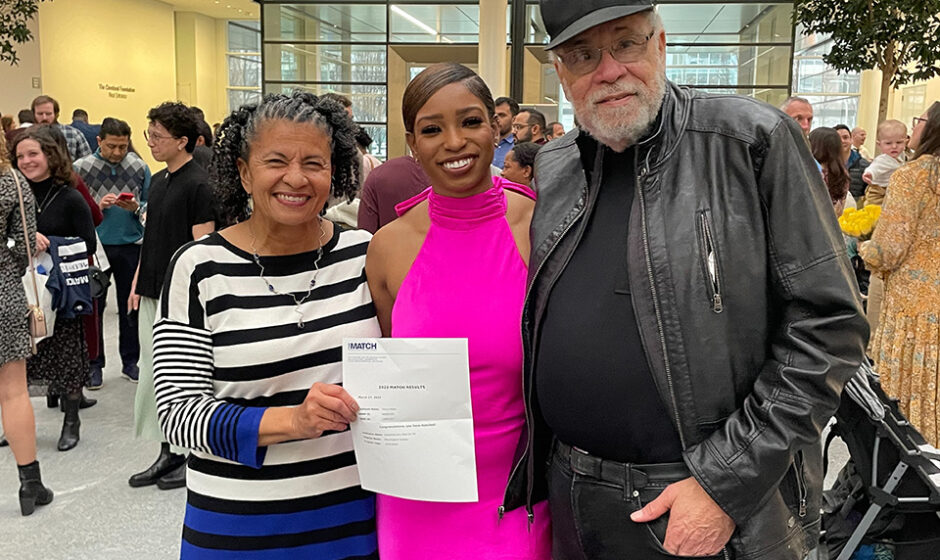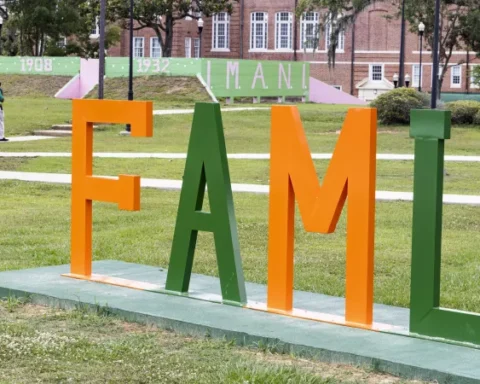By Janelle Sears
On “Match Day,” when thousands of medical school students anxiously awaited news of where they would serve their residency, Florida A&M University alumna Tamia Potter made history.
The Tallahassee native became the first Black female to join the neurosurgery residency program at Vanderbilt University Medical Center (VUMC) in Nashville.
“You read about moments like these and think to yourself what an amazing accomplishment that is, but this time it was me,” said Potter, who will move to Tennessee after graduating from Case Western Reserve University School of Medicine in May. “Once it set in that this was what I accomplished, I was in disbelief.”
Potter is excited to study and focus on the topics she is most passionate about. She knows the pressures behind her new position and is ready to face them head-on.
“I must ensure I am setting an example for the Black and Brown students who look up to me,” Potter said. “I want them to understand that it is okay for your journey to look different from those around you. Sometimes it is very scary because everything that has worked for everyone else is not working for you. It is okay to be unique, it is okay to be different, but it is important to appreciate the differences that you have and learn how to make your path.”
Potter had her eyes on the prize a long time ago. As a student at Wakulla High School, she earned her Certified Nursing Assistant (CNA) license. At age 17, she worked her first job at a nursing home. In 2018, Potter earned her bachelor’s in chemistry with a minor in biology and took her talents to Case Western Reserve University School of Medicine.
The third-generation Rattler credits FAMU’s “social atmosphere” as integral to her journey.
“It gave me the confidence to speak to attending physicians, residents, and even patients,” said Potter, who spoke about how the network at FAMU prepared her for the more personal side of the medical field.
Fran Scott, director the FAMU Pre-Medical Program, said Potter’s success is a clear indication that the program is trending in the right direction and is best positioned for preparing and placing African American students into medical school and onward.
“Current students are excited about their possibilities and have much reason to be since hearing about Tamia,” Scott said. “FAMU does an excellent job of attracting some of the best and brightest students in the nation that have all the tools to excel in the medical fields.”
The importance of representation is crucial to Potter’s journey to neurosurgery. While in medical school, Potter met Black female neurosurgeons, Dr. Debbie Blades, MD., and Dr. Tiffany Hodges, MD.
“They were why I even knew it was possible to be an African American female neurosurgeon,” Potter said. “Before I moved to Cleveland, I never saw a Black woman neurosurgeon. I knew what I was doing was going to be difficult, but just seeing that it is possible by meeting them was an amazing feeling.”
The experience speaks to the importance of an HBCU graduate seeing people who look like them in their desired fields, especially when the spaces may not have always been welcoming.
“Having representation allows for students to see that their goals and aspirations are possible.” Potter said. “Knowledge is your friend as a Black woman, it is the key to liberation and endless opportunities.”
Potter said as she speaks about how her experience as a Black woman has prepared her the most for her new journey.
“You must be a good communicator and patient, your patients and even some colleagues do not have the same training and educational background as you; you must make sure they understand you, and it’s reciprocated. This is the life I have lived as a Black woman, navigating the different spaces around me,” said the 26-year-old. “You learn to work harder, hold yourself to higher standards, and understand everyone around you, even though they may not understand you. As a Black woman you not only have to be excellent, but excellent with low tolerance of mistakes to be seen as equal.”





